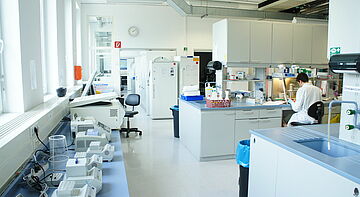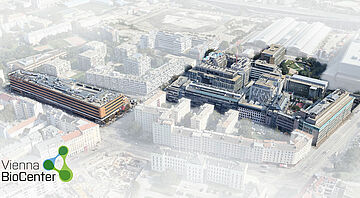Research Areas
Anthropogenic Evolution
Even though human beings and mammals share many biological traits, the cumulative development of technology, language and culture has led to fundamental changes in our relationships with the environment, other living beings, and ourselves. This has influenced and will continue to influence how human beings have evolved in the ecological niche they have, to a large part, created themselves.
Read more
Biochemistry, Biophysics, Structure
Scientists at the Vienna BioCenter are using bottom-up approaches to discover how individual molecules assemble into sophisticated 3D structures that perform highly specialized cellular functions. By combining biochemistry research, biophysics research, and state-of-the-art structural methods, scientists are resolving macromolecular complexes at atomic resolution, reconstituting multi-component complexes in vitro, studying protein-ligand interactions, and observing molecular machines in action.
Read more
Cell and Chromosome Biology
To get fundamental insights into how a cell, the basic unit of life, is organized and divides, a highly interactive research community at the Vienna BioCenter uses cutting-edge approaches, including super-resolution microscopy, high-content screening, biochemical reconstitution, and genomics, to functionally dissect the molecular biology of the cell.
Read more
Cognitive and Behavioral Biology
Our Cognitive and Behavioral scientists study the neuronal, hormonal, and cognitive bases of behavior. The strength of this research derives from a comparative approach encompassing numerous model organisms and a variety of research approaches that study questions ranging from the development and function of neuronal circuits to animal behavior in social groups. This research investigates the interplay between genetic, physiological, and environmental factors that significantly influence the behavior and cognition of animals and the evolution of behavior.
Read more
Computational Biology, Genomes and Evolution
To understand the vast complexity in biology, many research projects at the Vienna BioCenter have integrated algorithm development, modeling, and high-throughput processing of data. These computational tools enable the next-level analysis of large amounts of biological data, ranging from high-throughput microscopic images to genome sequences or thousands of single-cell transcriptomes, and are also indispensable for evolutionary biology research.
Read more
Disease Mechanisms, Immunology, Pathogens
Exploiting the wide range of expertise and model systems at the Vienna BioCenter, researchers ask how certain mutations lead to disease, how organisms defend themselves against pathogens and malignant cells, and how we can use this knowledge to develop better therapeutics and improve agriculture.
Read more

Gene Regulation, RNA, Epigenetics
Research in gene regulation and gene expression, RNA biology, and epigenetics at the Vienna BioCenter combines diverse approaches ranging from biochemistry and cell biology to genomics and transcriptomics to unravel the connections between genomes and the transcripts they encode. A particular focus is on RNA research, where myriad roles for this nucleic acid have only recently come to light.
Read more
Microbiology and Environmental Systems Science
Research in Microbiology and Ecosystem Science at Vienna BioCenter aims to reveal structure-function relationships of microbial communities in environmental and medical systems and to reach a comprehensive understanding of host-microbe interactions. Research in this area is essential to understand the role of microbial communities for the functioning of complex ecosystems and their susceptibility to global change due to human activities.
Read more
Neurobiology
The Vienna BioCenter is highly respected in the Vienna neuroscience scene as well as the global neurobiology community, and uses state-of-the-art techniques to address fundamental questions in the field. How do brains form and evolve? What are the molecular mechanisms that process and store information? How do activity patterns in neural circuits produce perception and behavior? And what mechanisms underlie neurological disorders?
Read more
Plant Sciences
Researchers at Vienna BioCenter discover fundamental molecular mechanisms that operate in a diversity of plants – from unicellular algae to tall, long-lived trees. These mechanisms provide a detailed understanding of the key role plants play in the Earth system. Some of our discoveries may help humanity live within the planet’s natural resource boundaries at a time when the Earth is heating at unprecedented rates.
Read more
Stem Cells, Development, Regeneration
Scientists at the Vienna BioCenter are using their cutting-edge research infrastructure to uncover the signaling steps and regulatory mechanisms that control tissue, organ, and organismal development. This area of research has enormous biological and medical relevance, providing insights into developmental diseases and cancer, as well as tissue and organ regeneration.
Read more


